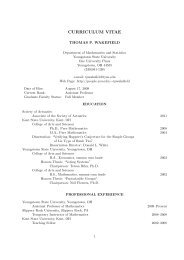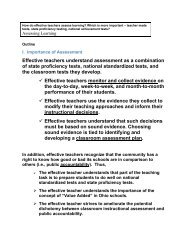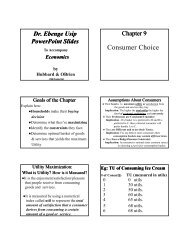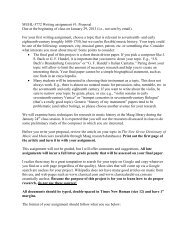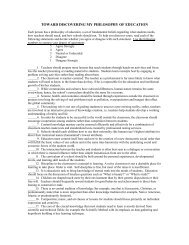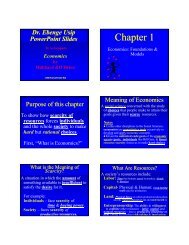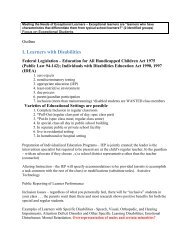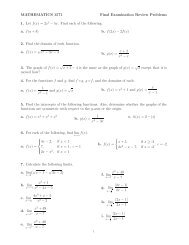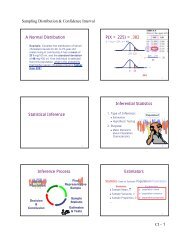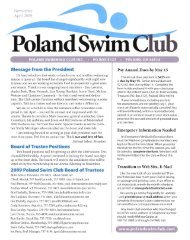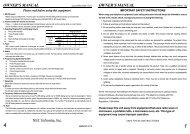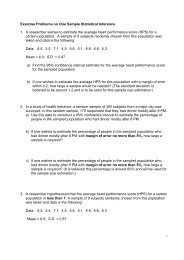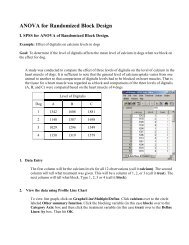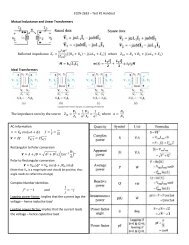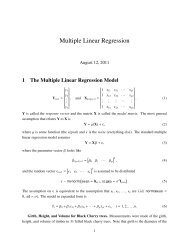CEEN 4881 - Youngstown State University's Personal Web Pages
CEEN 4881 - Youngstown State University's Personal Web Pages
CEEN 4881 - Youngstown State University's Personal Web Pages
You also want an ePaper? Increase the reach of your titles
YUMPU automatically turns print PDFs into web optimized ePapers that Google loves.
Civil & Environmental Engineering<br />
<strong>Youngstown</strong> <strong>State</strong> University<br />
<strong>CEEN</strong> <strong>4881</strong> – Geotechnical Engineering / 3 s. h. Spring 2012<br />
Instructor: Anwarul Islam, Ph.D., P.E.<br />
Office Hours: M, W: 0930-1100<br />
T: 1200-1400<br />
Office: 2430 Moser Hall<br />
Phone: 330-941-1740<br />
E-mail: aaislam@ysu.edu<br />
Prerequisites: MATH 2673, <strong>CEEN</strong> 3749 and an unrecalculated GPA of 2.0 or better in all <strong>CEEN</strong><br />
(major) courses.<br />
Text<br />
• Principles of Geotechnical Engineering by Braja M. Das, 7 th Edition, CENGAGE<br />
Learning.<br />
References:<br />
• Principles of Foundation Engineering by Braja M. Das, 7 th Edition, Cengage Learning.<br />
• Foundation Analysis and Design by Joseph A Bowles, 5 th ed., McGraw-Hill Science<br />
Course Content<br />
The course contents are as follows:<br />
• Introduction to geotechnical engineering practices and historical review<br />
• Geotechnical investigation and data collection<br />
• Determination of mechanical and index soil properties<br />
• Principles and applications of (i) stress distribution in soils; (ii) earth pressure; (iii) earth retaining<br />
structures<br />
• Fundamentals of slope stability and embankment analysis<br />
• Fundamentals of foundation settlement and bearing capacity applications<br />
General and Grading Policy<br />
The final grade for this course will be based on the following:<br />
2 Mid-term Exams (2 @ 25% each) 50%<br />
Final 30%<br />
Homework 10%<br />
Project 10%<br />
Score<br />
Grade<br />
90 - 100 A<br />
80 - 89 B<br />
70 - 79 C<br />
60 - 69 D<br />
Less than 60 F<br />
• Assignments are due a week after they are assigned. Late assignments and project reports will not be<br />
accepted. Free-hand drawn sketches in the assignments will be penalized. All assignments must be done<br />
using one side of green engineering papers. Copying from others in doing homework is strictly<br />
prohibited, and will result in zero grades for all parties concerned.<br />
• It is very important that you participate in the class activities. Class participation will include asking<br />
and answering questions in the class. Use of cell phones/beepers is strictly prohibited in the class.<br />
• Bring your class notes, text book and calculator every time you attend a lecture.<br />
• All the exams will be closed-book closed-notes. The necessary materials such as charts, tables and<br />
figures will be given as needed.<br />
• The project will be a group effort. Each group will consist of 3 to 4 students depending on the class<br />
size. Each student in the group must demonstrate his or her efforts in the project. An interim report on the<br />
progress of the project must be submitted by March 30, 2011.<br />
The spirally bound final report shall include the following:<br />
1. <strong>State</strong>ment of the problem, 2. Method of analysis, 3. Figures, 4. Calculations, and 5. References.<br />
Word processing and other graphic programs shall be used to produce the text, figures and charts of the<br />
final report. Handwriting or free-hand sketches are not allowed in the final report.<br />
1
Civil & Environmental Engineering<br />
<strong>Youngstown</strong> <strong>State</strong> University<br />
Attendance<br />
Attendance will be considered as it is reflected in assignments and class participation.<br />
Incomplete Grade Policy<br />
Often times a situation will arise where a student, due to reasons beyond his/her control, is unable to<br />
complete the requirements for the course. An incomplete grade or a grade of “I” can be issued. Under<br />
YSU policy, the student has to complete the course requirements by September 1 of this year, or the grade<br />
of “I” reverts to the grade of “F.”<br />
Disability <strong>State</strong>ment<br />
In accordance with University procedures, if you have a documented disability and require<br />
accommodations to obtain equal access in this course, please contact me privately to discuss your specific<br />
needs. You must be registered with the SP/Disability Services, located at 275 Fifth Avenue, and provide a<br />
letter of accommodation to verify your eligibility. You can reach the CSP/Disability Services at 330-941-<br />
1372.<br />
Academic Honesty<br />
Academic honesty and personal integrity are the foundations upon which a quality education is built. A<br />
student is referred to the University’s policy on academic policy in the YSU Undergraduate Bulletin.<br />
Course Objectives<br />
The main objective of this course is to acquire necessary knowledge and skills in the area of geotechnical<br />
engineering to develop the required proficiency needed to analyze and design different geotechnical<br />
systems. Moreover, the students shall demonstrate that they attained the following knowledge and skills:<br />
• Understand the mechanical and index properties soils, and analyze the laboratory/field testing<br />
results with respect to a given practical application.<br />
• Utilize knowledge of soil mechanics to identify, formulate and solve practical geotechnical<br />
problems.<br />
• Use computational tools to analyze and design retaining walls, foundations, and embankments.<br />
• Search for additional information outside the domain of the textbook or class handouts.<br />
This is a basic course in geotechnical engineering tailored for junior and senior level civil engineering<br />
students. It is anticipated that each student will develop the following attributes as the result of a<br />
successful completion of this course:<br />
• an ability to apply knowledge of math, science, and engineering<br />
• an ability to design a system or component to meet desired needs<br />
• an ability to communicate (in writing) effectively<br />
• a recognition of the need for, and an ability to engage in life-long learning<br />
• an ability to use techniques, skills, and modern engineering tools<br />
• an ability to identify, formulate and solve engineering problems<br />
• an ability to apply basic design philosophies to new situations<br />
• an ability to explore a variety of design scenarios from multiple perspectives<br />
• an ability to solve problems, and as a result, strengthen critical thinking skills<br />
2



